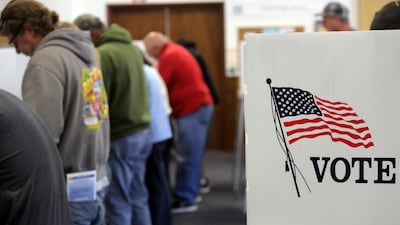The American midterm elections have been mired in controversy, with the Republicans accused of trying to cheat their way to victory.
After two tumultuous years of the Donald Trump presidency, Democrats hope a “blue wave” of voters will enable them to regain control of the House of Representatives in three weeks' time.
However many of the key battles may be fought in the courts amid allegations of gerrymandering and political sleight of hand intended to deny thousands of voters the opportunity to cast their ballot.
“There is a range of different techniques,” said Alex Keyssar, professor of history and public policy at Harvard University. “Some are now very much in place, such as the requirement for Voter ID. The Democrats have found ways of getting people the right documents so they can circumvent the repressive efforts."
Other techniques have included purging electoral rolls which, in states like Ohio, have had a repressive impact, Prof Keyssar added.
“There have been issues where the number of voters was significantly larger than the population. I don’t think there is anything intrinsically wrong in requiring voter ID, the question is how you do it.”
Justin Levitt, a professor at Loyola Law School in Los Angeles, believes the system is flawed.
"We have elected officials who set the rules for their own election contests. It doesn't leave voters with a great deal of confidence," he said.
_________
Read more:
Updates: Follow our live coverage of the midterms
In the deeply divided US, it is difficult to predict the outcome of next month's midterm elections
For US celebrities, like Taylor Swift, no comment on politics is no longer an option
2018 midterms: Everything you need to know about the US elections
Democrats are embracing diversity ahead of crucial mid-terms
_________
It is the state of Georgia that is currently generating the most controversy because of the “exact match” law which has led to the registration of 53,000 voters – a majority of whom are black – being put on hold.
Stacy Abrams, the Democrat candidate who is black herself, has cried foul at the action taken by Brian Kemp, Georgia’s secretary of state – and Republican candidate for governor.
“This isn’t incompetence; it’s malpractice,” said Abigail Collazo, her spokeswoman.
This was denied by Hans von Spakovsky, a legal fellow with the conservative Heritage Foundation and a former member of the Federal Elections Commission.
“This has been the law for 10 years and the claims that this has decreased turnout is untrue,: he said. "Turnout among black and Hispanic voters increased.”
According to one estimate 24 states, mostly under Republican control, have more restrictive voting laws now than in 2010.
This is in part due to a Supreme Court ruling in 2013 which gutted the 1965 Voting Rights Act, Lyndon B. Johnson’s landmark legislation enfranchising millions of black Americans in the south.
The other bone of contention is gerrymandering which has seen congressional districts sliced and diced for political advantage.
Although the Democrats’ hands are hardly clean, the Republicans are accused of drawing up boundaries in several to give them an unfair political advantage.
The courts have stepped in. Virginia has been told to go back to the drawing board.
But North Carolina has been allowed to keep its map even though it was found it was drawn for partisan purposes, because there is not enough time to put things right ahead of the midterms.
Logan Churchwell, a spokesman for the conservative-leaning Public Interest Legal Foundation, denied that states were trying to disenfranchise voters for political reasons.
“Georgia is acting with clear reasonableness by requiring registrants with faulty Social Security information to provide ID when voting next month,” he said.
“This ‘controversy’ is a tried-and-true base motivator for a political candidate who has demonstrated particular savvy on the subject matter.”
Ohio, Mr Churchwell added, had fought off a legal case which would have “a six-figure” number of outdated registered voters to be reinstated.
“The plaintiffs could not provide a single registrant harmed, but sought to stoke 11th-hour controversy all the same - and failed,” he said.
Strict voter ID laws were also justified to protect the integrity of the electoral system.
“We are living in a post-2016 environment where these systems are now subject to targeting from cyber aggressors,” he added.
“The best preparation for an eventual attack is making sure that outdated and inaccurate information is identified and processed for timely correction.
“Actors standing in the way of these efforts only make these targets softer and recoveries even more painful after the walls are breached.”
However, Julie Ebenstein, the senior staff attorney with the American Civil Liberties Union’s voting rights project, is unconvinced.
“The effect of election laws are no mystery,” she said. “Legislators can determine who will be affected when they pass suppressive laws such as strict voter ID requirements in North Dakota, or exact match voter registration restrictions in Georgia.
“Eligible, registered, US citizens are disenfranchised for no reason other than what cards that have in their wallet, or whether they have good penmanship.”

